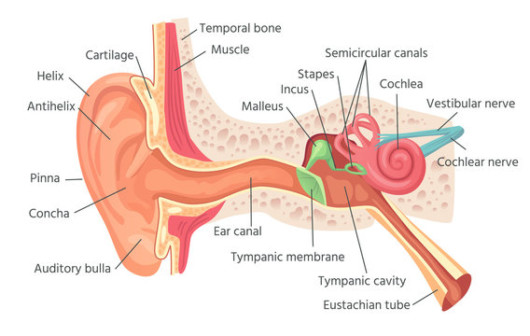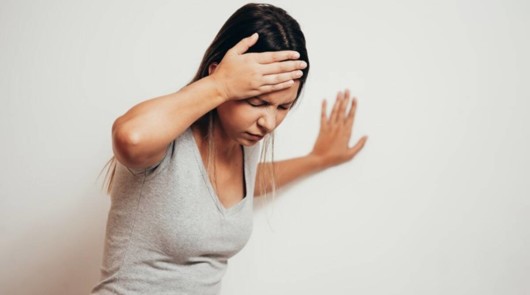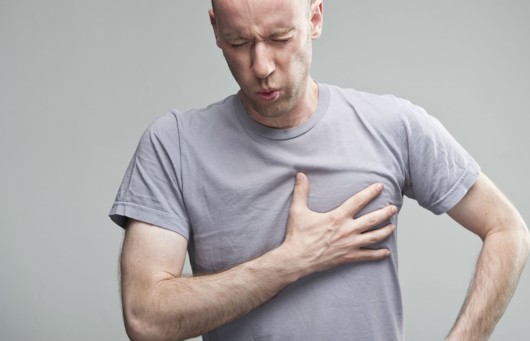So, you got all the way to the gym, started your workout, and now you’re dizzy – what happened?
There are so many reasons you can become dizzy. If you are struggling to figure out why, here are some quick tips.
Dizziness has many different definitions, it can feel like:
- room spinning vertigo
- breathlessness imbalance
- lightheadedness
Almost everyone has experienced some sort of dizziness, and the symptoms can be accounted for by many different parts of your body. These systems can include:
- your cardiovascular system
- vestibular system
- pulmonary tract and many others
Always seek medical advice from your doctor as your main form of healthcare, but here is a great place to start.
Vestibular System

Your inner ear is most frequently the source of dizziness. It is home to two organs, your cochlea and your vestibular organ. The cochlea is the organ that receives sound waves to help you hear. Your vestibular system helps with balance, tracks head motion, and controls equilibrium. This multifaceted system can be impacted mechanically, through homeostasis, or neurologically. Being able to tell the difference, and finding a doctor or provider who knows the difference, is incredibly important. Dizziness is one of the top three complaints in the emergency department, but many providers don’t know how to properly diagnose the cause or treat the symptoms.
Vestibular Symptoms
Vestibular symptoms look different than other dizzy-diagnoses. If you lay on the floor for sit ups, or perform downward dog, you may have room spinning dizziness. Positional room spinning dizziness is most frequently Benign Paroxysmal Positional Vertigo, a mechanical problem where tiny ear crystals, otoconia, are displaced into your semicircular canals. This can be treated with a maneuver to roll the otoconia back into place, commonly known as the Epley Maneuver.
Other vestibular-related-dizziness symptoms are dizziness from turning your head, rounding a corner, driving in a car, or reading a book. Diagnoses such as Vestibular Migraine, Meniere’s Disease, or Vestibular Neuritis all cause this kind of dizziness. These are deeper than a mechanical problem and require lifestyle changes and/or rehabilitation of your vestibular system.
If you think you have vestibular-related-dizziness, talk to your doctor or physical therapist about vestibular rehabilitation. Vestibular rehabilitation will slowly habituate your brain and vestibular system to remember what it is like to move your head back and forth without the feeling of lightheadedness or fogginess.
Cardiovascular System
Your cardiovascular system is responsible for circulating blood through your body. Oxygenated blood leaves your heart through arteries and comes back through your veins to be re-oxygenated. Your heart pumps blood faster or slower depending on many factors. Your resting heart rate is your heart rate when you’re not doing anything, like when you’re laying down or seated.
A normal resting heart rate for adults is 60-100 beats per minute, and when you begin to do activity, it will get higher. Lower resting heart rates are typically indicative of better health. For instance, endurance athletes can have heart rates as low as 40-45 beats per minute. Exercising regularly, even if not training for distance running or walking, will help to lower your resting heart rate and is extremely healthy. Your heart rate and blood pressure work together to continuously circulate blood and help us stay oxygenated.
Causes of Cardiovascular Dizziness

A blood pressure that is too low can make you dizzy if we aren’t getting enough blood and oxygen to our brains. A blood pressure of 120/80 is considered average, but most of us fluctuate within a few points of that norm. Your doctor should always measure your blood pressure, and you should be treated accordingly. Low blood pressure (>120/80) can cause orthostatic hypotension, a condition that makes you feel dizzy when you stand up too quickly.
Many of us refer to this as a “head rush” when we get up too fast. Orthostatic hypotension occurs when our blood pressure drops when we stand, and our heart does not respond quickly enough by increasing our heart rate. This should last less than 15 seconds. If it lasts longer, talk to your doctor about potential solutions to decrease your risk of falling over or passing out.
Another common health concern is high blood pressure. Although high blood pressure does not usually make us feel dizzy, the medications that are taken to treat the condition can. If you have recently started a new blood pressure medication and you’ve started to feel dizzy, talk to your doctor about taking a different medication, or to see if they have another recommendation.
Your cardiovascular health is particularly important, and lack of cardiovascular health can sometimes lead to dizziness. This kind of dizziness can come from an aging heart or if the electrical signals in your heart are not communicating correctly. You should check in with your healthcare team if you feel dizzy when you do light, moderate, or high intensity exercise. Never begin or change an exercise routine without first talking to your doctor.
Pulmonary System

Shortness of breath with mild to moderate activity can sometimes lead to dizziness or the feeling of lightheadedness. These are not symptoms to ignore. Like with cardiovascular dizziness, pulmonary-related dizziness symptoms are not to be discarded, always be sure to investigate why you’re feeling dizzy.
Pulmonary Symptoms
- progressive shortness of breath with easy activities
- a racing heart
- blue or grey lips
- swollen ankles
These are signs of pulmonary hypertension. Pulmonary hypertension is high blood pressure inside your lungs, causing buildup of fluid. This fluid buildup will lower the amount of oxygen in your blood, causing hypoxia, leading to dizziness. The cause of pulmonary hypertension is usually unknown and is often hereditary. If you are having shortness of breath, dizziness, chest tightness, ankle swelling, or abnormal fatigue, talk to your doctor about ways to handle pulmonary hypertension.
Often, seeing a physical therapist is a great way to work on your endurance and stamina. A physical therapist will help you meet your activity goals by providing a graded walking program, give you tips on more effective ways to breathe, and can help with energy conservation! If you are exercising and becoming dizzy, physical therapist is an excellent asset to your medical team.
Anxiety
Dizziness and anxiety are best friends. When anxiety occurs, dizziness frequently follows. Stressful events in your life, including school or tests, work presentations, and personal stress can all be causes of dizziness. Being dizzy is just one symptom of being anxious, knowing the signs of anxiety that are most relevant to you is important. Anxiety can present itself in many ways, including:
- irritability
- increased heart rate
- feeling general stressed
- increased or decreased hunger
- mood changes
- sweating
These feelings and symptoms may not all come simultaneously, or at all. In fact, you may have completely different symptoms than your friends or family. It is important to remember that we are all different, and experience different feelings and emotions.

Treating your anxiety and dizziness is vital so seeking help from the right provider is essential. Either the anxiety needs to be treated to stop dizziness, or dizziness needs to be treated to stop the anxiety. Because this is a “chicken or the egg” kind of situation, it is important that a doctor, therapist, or physical therapist help you to determine the source of the symptoms and provide a solution.
At your appointment, your provider may ask you about stressful life events, your responses to previously stressful situations, and how you handle stress. Even if you are the kind of person who thrives under pressure and handles stress well, it can still be the cause of your dizziness. Do not rule something out completely just because you have been totally fine in the past. Taking a holistic view of yourself and seeing everything you may be dealing with at once is a great way to take a look into your life and see what may be negatively impacting you.
Dehydration
Being dehydrated has a direct impact on your blood volume, and therefore your blood pressure. As we discussed above, a low blood pressure will frequently cause dizziness. The drop in blood pressure will create decreased blood flow to your brain, and therefore provides less oxygen to your brain. This can cause symptoms of orthostatic hypotension, the feeling of head rush or being faint, when you stand up. Your body is approximately 60% water, and keeping it hydrated is critical. It is good for your brain, your skin, your internal organs, and your general health.
How Much to Drink?

The amount of water you should drink depends on factors such as your activity levels, diet, environment, and if you are pregnant. However, a good rule of thumb for how much water to drink is: eight 8-ounce glasses of water per day. This is around eight cups that would be found in your kitchen cabinet, or 4-pint glasses (16oz) of water. Drinking water, diluted juice, and decaffeinated tea to maintain your fluid levels is the key. Avoid coffee, caffeinated tea, and soda. These are bladder irritants; urinating more than necessary decreases the level of dehydration and fluids in your body.
Continuously drink water throughout the day, sipping frequently, to maintain hydration and avoid dizziness. Other symptoms of dehydration are:
- thirst
- fatigue
- decreased focus and attention
- dark colored urine
If you have reason to believe you are dehydrated, try drinking one or more glasses of water and see if you begin to feel better. Symptoms of dehydration do not disappear immediately with drinking water, but it should happen relatively quickly. If these symptoms persist, talk to your doctor about other potential diagnoses that may present similarly to dehydration.
Dizziness has so many meanings, and can be a symptom of dysfunction from many different systems in our bodies. Determining the source of your symptoms and receiving proper treatment is very important to your physical, emotional, and intellectual health. Whether you are having dizziness from your cardiovascular system, or because of an inner ear dysfunction, there is treatment and you should seek help from your healthcare team. By taking the information from above, you can start to determine the source of your dizziness.
Author Bio:

Dr. Madison is a vestibular physical therapist based in Manhattan, New York who specializes in treating dizziness and vertigo of all kinds. She graduated with a clinical Doctorate in Physical Therapy from the University of Wisconsin and has been treating patients with dizziness ever since.
Dr. Madison understands that dizziness comes in many forms, from vertigo to lightheadedness, and knows that finding the source of your dizziness is the best way to treat it. Finding the root of your problem, and treating the whole person, instead of just the symptoms, is very important to her. She strives to help her patients reach functional goals to return to a dizzy-free way of life.
See more about Dr. Madison at thevertigodoctor.com and @thevertigodoctor on all social media platforms.



